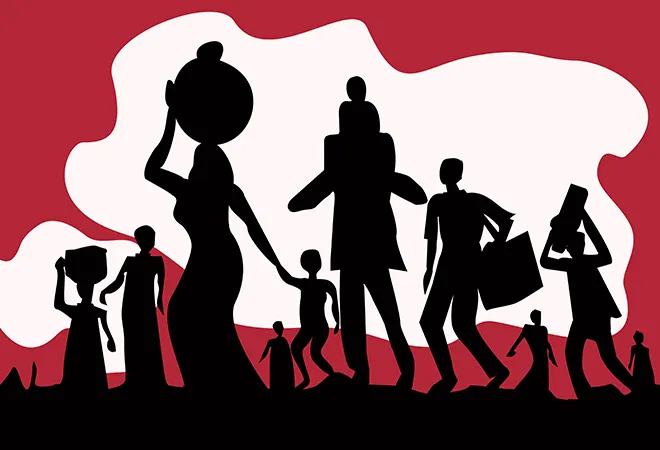
The pandemic has brutally exposed structural inequalities in cities of the Global South. Deep social divides in city systems regarding access to shelter, piped water, sanitation and public health care that we had glossed over for long, are now coming back to haunt us, as one billion people or 24 percent of the global urban population living in congested slums, find it challenging to meet basic hygiene norms, such as hand washing and physical distancing. We need a new social contract to address deepening urban divides and chart a more inclusive roadmap towards recovery.
The World Bank has estimated that the Covid-19 pandemic may push down between 70 to 100 million people below international extreme poverty line of US$ 1.90 a day. Countries with large concentrations of poor such as India and Nigeria are particularly vulnerable. To cushion the poor against the economic shock, several countries had announced cash transfers, food subsidies, and other welfare packages. But such national efforts are inadequate to fight global dimension of the pandemic induced poverty. The Secretary-General of the United Nations António Guterres emphasised on greater multilateral cooperation and called for ‘a new social contract for a new era’ to fight this ‘pandemic of inequality.’ National and global economic recovery strategies need to factor in the pandemic’s urban dimension. Cities are indeed on the front line of coping with the pandemic and lingering impacts on lives and livelihoods. Stimulus packages and welfare measures need to be supplemented with focused city scale policy actions.
To cushion the poor against the economic shock, several countries had announced cash transfers, food subsidies, and other welfare packages. But such national efforts are inadequate to fight global dimension of the pandemic induced poverty.
Urban areas account for an estimated 90 percent Covid-19 cases. But are also associated with jobs, aspirations, and economic turnaround. Cities account for 80 percent of the global GDP. As recent experience Covid-19 has clearly brought out, economic footprints spread far wider than their immediate surroundings and impact distant rural regions. According to the International Labour Organisation estimates, global working hours had dropped by 14 percent in the second quarter of 2020 due to the shutdowns, which is equivalent to a loss of 400 million full-time jobs. The impact had been particularly devastating on informal economy, which accounts for 90 percent of the jobs in the poorer countries.
Risks of the cities are linked with their logistical functions. Cities are nodal points of flows — of money, materials, people, and occasionally pandemic too. Metro cities are not merely sites of production and consumption, but rather hubs of interchange between global and regional transportation networks and supply chains — which increases their risk levels. However, spread of the Covid-19 contagion is not uniform across the cities but rather socially produced through pre-existing fault lines. Cities having similar population densities and levels of economic development had fared differently in their ability to contain coronavirus. How a city copes with the crisis are to a large extent shaped by its disaster management capacities, urbanisation patterns and existing service delivery systems.
Metro cities are not merely sites of production and consumption, but rather hubs of interchange between global and regional transportation networks and supply chains — which increases their risk levels.
Quality and effectiveness of urban governance matters: Good governance can reduce virus transmission chain and build resiliency. Conversely, inadequacies in governance may exacerbate the crisis and increase urban vulnerabilities. Socio-economic inequalities, inadequate access to basic amenities and unhygienic living conditions tend to magnify public health crisis. Residents of slums and informal settlements which are often 10 times more crowded than formal areas; where tens of people live in a single room; where hundreds share common toilets; and where availability of water is only intermittent — were impacted in disproportionately higher numbers during earlier epidemics like H1N1, swine flu and dengue.
Until now determined ground level effort by the municipal governments and community activists may had managed to prevent large scale transmission of Covid-19 in some of the prominent slum clusters, such as Dharavi in Mumbai or Rocinha favelas in Rio de Janeiro. But there are reports of silent surge in areas like Orangi Town in Karachi, Payatas in Manila, or Kibera in Nairobi. Authentic data about informal settlements are often hard to come by. Traceability are also low — especially in smaller slums in secondary cities. So, there is no scope for complacency yet.
Quality and effectiveness of urban governance matters: Good governance can reduce virus transmission chain and build resiliency.
It is necessary to take a nuanced approach towards pandemic management as urban poor are not a homogenous community. Their exposure to vulnerabilities differs significantly due to factors such as gender, age etc. The Covid-19 vulnerable population dashboard of the United Nations Population Fund, classifies people according to older person, person living alone, population density, household size, persons per room, and access to piped water and other civic amenities — which are all functions of urban management. The coronavirus pandemic indeed highlights the critical role city governments as frontline responders in crisis response, recovery, and rebuilding.
However, local government often face capacity constraints and encounter operational difficulties in directly reaching out to the target groups on the ground. Under the situation, civil society, and community-based organisations act as force multipliers. For example, when the migrant workers got stuck during the lockdown, Urban Local Bodies in Kerala promptly set up community kitchens and distributed relief materials by mobilising women-run Self Help Groups under the Kudumbashree programme.
Implementation of the Sustainable Development Goals (SDG) and the New Urban Agenda (NUA) can go a long way towards this as concepts of inclusivity and resiliency are implicitly integrated into such global frameworks.
Community organisations also play crucial bridging roles between the government and people. Their strength lies in their intimate grassroots level knowledge of the area, and the trust they enjoy with the communities. When the city government of Dhaka sought to distribute food to the poor during lockdown, it was realised that detailed information about vulnerable households not readily available and sought assistance of the Urban Poor Federation of Dhaka North City — a coalition of 350 Community Development Committees (CDC) organised around savings groups. Community leaders from the CDCs swung into action by mobilising its wide organisational network to identify the target groups and ensure delivery of food assistance.
Similar collective action had also emerged to provide long-term livelihood support to the urban poor impacted by the pandemic induced in economic crisis. For example, Indonesia’s National Slum Upgrading Program (NSUP) which provides community infrastructure grants, has now forged partnerships with the local governments and slum communities. Over the past two decades, NSUP had established a huge network of 11,000 community organisations. The project resources and the organisational networks are now being redeployed to improve water supply, sanitation and improving hygienic conditions in slum areas while creating new jobs for the urban poor impacted by the pandemic.
There is an urgent need to empower cities to respond to the Covid-19 crisis and potential future pandemics through new social contracts — by focusing on building greater resiliency and inclusivity through participatory governance processes.
However, many cities are suffering due to the weakness of their disaster management capacities and inadequacies of community engagement mechanisms. There is an urgent need to empower cities to respond to the Covid-19 crisis and potential future pandemics through new social contracts — by focusing on building greater resiliency and inclusivity through participatory governance processes. Implementation of the Sustainable Development Goals (SDG) and the New Urban Agenda (NUA) can go a long way towards this as concepts of inclusivity and resiliency are implicitly integrated into such global frameworks.
The SDGs adopted by the United Nations in 2015, offers a comprehensive framework to address vulnerabilities of the urban poor and by facilitating access to affordable housing, provision of safe drinking water, and public transport systems. To make timely progress towards achieving sustainability goals, the targets and indicators of SDGs need to be aligned with the delivery process of development plans and the budgetary priorities of local governments. The New Urban Agenda adopted by the UN in 2016 has further expanded the scope for a new social contract in cities through localisation of the SDG targets for more inclusive and participatory processes of urban planning and governance.
India has indeed made tangible progress in attaining various SDG targets in recent times. The most notable being poverty reduction between the 2005-16 period, when nearly 273 million people were pulled out of multidimensional poverty — largest by any country in the world. That gain is now in the danger of being negated. Focused attention to improving the livelihood and livability conditions of the urban poor through coordinated approach between the national, state and the city governments are indeed need of the hour.
The views expressed above belong to the author(s). ORF research and analyses now available on Telegram! Click here to access our curated content — blogs, longforms and interviews.




 PREV
PREV



